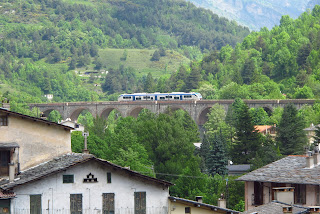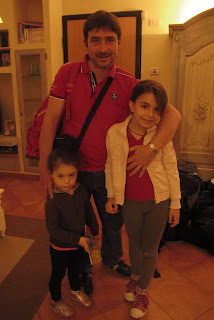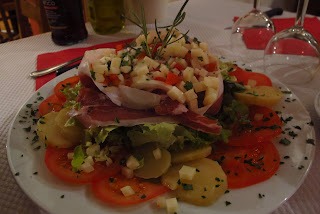Giovannina and I decided to spend the last weekend of our trip in France. I studied in Paris back in college and have been itching to return to the land of brie, Mitterand and frog legs ever since. I wanted to see how rusty my French really is and if I could navigate us through a foreign country without offending every waiter and hotel concierge we met.
We wanted to do some hiking and didn't want to rent a car, so we decided to take a train to the small, mountain town of Tende, France. Tende is an interesting place. Only an hour from the Mediterranean coast via train and at 1500 m (4500') in elevation, Tende is perched high up in the Maritime Alps just a stones throw from the Italian border, or at least the current Italian border. Like many countries in Europe, France and Italy have moved their borders around several times due to war, treaty or wink-wink-nudge-nudge agreements between monarchs, dictators or some other oligarchs. With the help of Giuseppe Garibaldi, Italy unified (mostly) as its own country in 1861. At that time, the county of Nice (where Garibaldi was born) decided to side with France, really peeving Giuseppe. However, Napolean III let friend Victor Emmanuel, (a.k.a. King of Italy) keep the Tende Valley as his own private hunting reserve. Pretty sweet. So until WWII, Tende was Italian -it was also called "Tenda". But after WWII, the French decided that they wanted this little piece of high alpine real estate back, and so in 1947 it became french once again, and has been ever since.
The folks that live in Tende consider themselves French, but many of them speak Italian or a funny mixture of Ligurian Italian and French known as Tendasque. As the valley was important as part of the Salt Route between Nice and Milan, being multilingual has helped the locals for centuries, and was very convenient for us as Giovannina could use her Italian with about an 80% success rate. Not bad.
Tende itself has been inhabited since 690 A.D., and much of the medieval city remains. But humans have been living in the area around Tende for millenia. Stone engravings located in the valleys around Tende date back to the Bronze Age (about 2900 B.C.) The most famous locations are Vallee Merveilles and Fontanalbe, which have over 35,000 different engravings. These were popular spots to write in rock. So popular in fact, that up until 1989 people were still writing on the rocks. When you visit the carvings, you can see ancient petroglyphs of cattle and fertility figures next to "GL Hearts HV '75." What can I say? Graffiti is nothing new.


We arrived in Tende on Friday June 1 on the train from Ventimiglia carrying all of our luggage including an addition piece of luggage filled with presents for folks back home. Thankfully, Tende is a small town and our hotel was not far from the train station. We checked in at Hotel du Centre and headed out to explore the countryside. We got a great hiking map from the information office and decided to take the trail to La Brigue, another medieval town in the next valley over. We hiked up and over a mountain ridge, crossing through fields of wildflowers and herds of sheep grazing on the hillsides, the clang of their bells carrying through the thin mountain air.


We arrived in La Brigue in the late afternoon and explored this ancient town. At first, it seemed to be mostly deserted, but upon further inspection we realized that most of the apartments were vacation homes for the Nicoise who escape the heat of the Mediterranean coast to the cool mountain air. We got a drink at a local pub and caught a train back to Tende for dinner with a loveable Brit named Hugh Watson, whom we met on the street earlier that day and had made plans with.
We stayed up late enjoying some wine, chevre cheese and good conversation. A great introduction to France.


Saturday we decided to go to Casterino, the gateway to Marcantour National Park. The shuttles were full so we decided to hitchhike -
faire du stop in French - our way to Casterino. This proved to be very easy and we got no less than three different lifts up the mountain. Once in Casterino, we made our way up to Vallee Fontanalbe. Surrounded by high, towering peaks and boulder strewn meadows we hiked through brilliant mountain sunlight and crisp, fresh air. There were a few other hikers on the trail, but not many.

We saw many Ibex with their big, curved horns and long raggedy coats and even a few of the skiddish, short-horned Chamois. And many, many marmots, their plump, golden bodies draped on the rocks and their whistles echoing across the valley as we walked past them.


We took a dip in the ice-cold Lac Vert and sunned ourselves dry before hiking up over the pass and back down the adjacent valley. We ended up at Les Mesches dam and caught another ride back to Tende from an old fisherman, quite contented with his catch of five fat trout.

Back in Tende we treated ourselves to more chevre and more wine before making our way to bed.
Sunday, we got up and had a rich breakfast of apple tarts and almond pie. With full bellies, we explored the Merveille Museum and then walked the streets and alleyways of the old town. Narrow, cobble-stoned and ancient, the pathways of Tende wound through the old town, between thousand year-old buildings and under medieval stone arches.



That afternoon we decided to hike from town up another adjoining hillside, our legs still sore from Saturday's long hike. But up we climbed until we were looking down upon Tende and could see all the way down the valley to St Dalmas. We took an old dirt road back down the mountain and hiked along a river, stopping in a field of wildflowers for lunch. We ate our last meal of salami and chevre as we watched the flower heads bob in the gentle breeze. That night we had goat cheese pizza - actually really good - and chevre salad with salted duck and tiramisu with apples for dessert. We had more wine of course but not too much because we had to be up early the next morning to catch our train to Milan, our last stop before flying back to Seattle.
To see more photos of Tende, check out
our web album.






















































